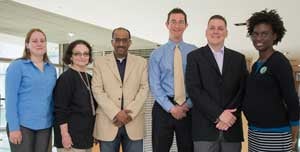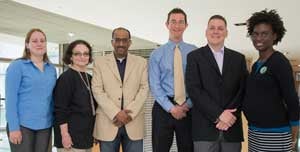 KINGSTON, R.I. – May 16, 2014 –The University of Rhode Island will award degrees this weekend to the first graduates of its Interdisciplinary Neuroscience Program.
KINGSTON, R.I. – May 16, 2014 –The University of Rhode Island will award degrees this weekend to the first graduates of its Interdisciplinary Neuroscience Program.
The University will grant a doctor of philosophy degree in interdisciplinary neuroscience to Stephanie L. Guertin, of Pawtucket, R.I., and to Kyle R. Scully, of South Kingstown, R.I., a native of Franklin, Mass., on May 17, 2014.
Aseef H. Ahmed, a 2007 graduate of South Kingstown High School, will be awarded a master of science degree in interdisciplinary neuroscience. He is attending the University of New England College of Osteopathic Medicine in Biddeford, Maine.
The first graduates in interdisciplinary neuroscience mark a milestone for the program formed in November 2011. It draws from the University’s six colleges and 12 departments to educate the next generation of scientists who will work on finding treatments for diseases such as Alzheimer’s, Parkinson’s and amyotrophic lateral sclerosis (ALS or Lou Gehrig’s disease).
The research is expected to grow because of the establishment in November 2013 of the George & Anne Ryan Institute for Neuroscience at URI, made possible by a $15 million gift from Thomas M. Ryan and his wife Cathy. Ryan is a 1975 pharmacy graduate of the University and former chairman, president and chief executive officer of CVS Caremark.
The Ryan Institute for Neuroscience will elevate the visibility of the groundbreaking work at URI and throughout the state, improving economic development in Rhode Island by creating a rich environment for the expansion of basic biomedical and translational research, advanced training and clinical practice in neuroscience.
The creation of the Ryan Institute for Neuroscience is helping to position Rhode Island as a leader in neuroscience research and in the treatment of neurodegenerative and neurological diseases.
 Guertin was admitted as a biology graduate student, becoming one of the neuroscience program’s designers, serving on committees to propose and seek state approval of the degree program.
Guertin was admitted as a biology graduate student, becoming one of the neuroscience program’s designers, serving on committees to propose and seek state approval of the degree program.
“The important aspect of this program is that it’s interdisciplinary,” said Guertin, who holds a bachelor of science in marine biology from URI and is a graduate of Farragut High School in Knoxville, Tenn.
“As I apply for post-doctoral positions, they are asking for biologists with experience in working with chemists, or with someone who understands computational aspects, and this is something this program offers that others don’t,” said Guertin.
Her research focused on the sensory genes in the hydra, similar to those in humans, that allow the organism without eyes to react differently to light and dark, and from one color to another.
 Scully, a graduate of Xaverian Brothers High School in Westwood, Mass., was first attracted to URI’s toxicology program for graduate school. When he was exposed to neuroscience, his research interest move in that direction. He joined Guertin in advocating for a neuroscience graduate degree.
Scully, a graduate of Xaverian Brothers High School in Westwood, Mass., was first attracted to URI’s toxicology program for graduate school. When he was exposed to neuroscience, his research interest move in that direction. He joined Guertin in advocating for a neuroscience graduate degree.
Scully’s doctoral research focused on designing compounds that prevent seizures using computer models; the compounds have been further tested in animals in collaboration with the National Institute of Neurological Disorders and Stroke.
“Its clinical impact could go far beyond epilepsy, to mood disorders, stroke outcomes and traumatic brain injury as well as neuropathic pain,” said Scully.
Ahmed was part of a research team that discovered how a compound in pomegranates limited the effects of Alzheimer’s disease in mice; the team is in the early stages of putting the paper together for publication in a journal.
“It suggests that there are natural products out there for Alzheimer’s disease, and we can look into developing them into potential therapies,” Ahmed said.
The executive coordinator of the program, Alycia Mosley Austin, praised the graduate students for their help and feedback that were essential in building the program.
“These students were pioneers not only in that they were the first students in the program, but also in that they put a tremendous amount of work into helping to get this program approved and off the ground,” Austin said.
“I also see their impact as mentors and role models to the students who have entered the program in subsequent cohorts. They have provided excellent examples for how to be engaged scholars both on campus and in the broader neuroscience community.”
Picture above
The University of Rhode Island’s Interdisciplinary Neuroscience Program celebrated the graduation of its first doctoral students. Left to right:
Stephanie Guertin, Gabriele Kass-Simon, Nasser Zawia, David Worthen, Kyle Scully, Alycia Mosley Austin.
Stephanie Guertin
Kyle R. Scully

